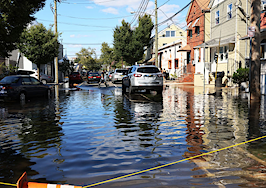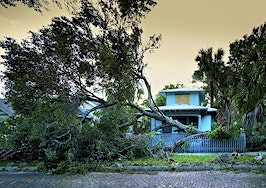Fannie Mae and Freddie Mac’s federal regulator has put executives at the mortgage giants on official notice that they’re now expected to factor the financial risks posed by climate change into their decision making.
The Federal Housing Finance Agency is also stepping up its monitoring and supervision of climate change issues, Acting Director Sandra Thompson said last week.

Sandra Thompson
Climate change “poses a serious threat to the U.S. housing finance system,” Thompson said, and Fannie and Freddie “have an important leadership role to play in addressing this issue.”
Each year, the agency issues a scorecard that’s intended to hold Fannie and Freddie accountable for fulfilling their core mission requirements — promoting sustainable and equitable access to affordable housing, and operating in a fiscally safe and sound manner.
The FHFA’s 2022 Scorecard specifies that as part of conducting their business in a “safe and sound manner,” Fannie and Freddie will be expected to demonstrate that they have a governance structure in place “to prioritize the effects of climate change throughout … decision making.”
A September report funded by the Mortgage Bankers Association warned of the potential for increasingly devastating storms, excessive heat and wildfires, and drought to stretch the National Flood Insurance Program to the breaking point, undermine home prices in vulnerable communities, and drive more homeowners to default on their mortgages.
A previous academic study of property records estimated that homes located in floodplains are overvalued by $43.8 billion because buyers aren’t factoring in the cost of fully insuring them.
‘Emerging and increasing threat’ to financial stability
The FHFA is a member of the Financial Stability Oversight Council, which was established by Congress in the wake of the 2007-09 mortgage meltdown and recession to identify and address vulnerabilities in the U.S. financial system. In an October report, the council identified climate change “as an emerging and increasing threat to U.S. financial stability.”
The council’s report noted that Fannie and Freddie regularly report loan-level data to FHFA that includes flood risk exposure data at the time of loan origination, including whether the property is located in a Special Flood Hazard Area and whether it’s covered by flood insurance.
But that’s just one measure of Fannie and Freddie’s exposure to flood risk over the life of the loan, the report noted, and climate change poses other perils such as wildfires, droughts, and hurricanes.
The council’s report warned that “increased analytical capacity and expertise is needed to generate predictions for both chronic risks, like sea-level rise, and acute risks, like wildfires or extreme rainfall events; damage functions for how physical risk translates to property damage; and models that translate those property damages to financial losses” for Fannie and Freddie.
Although FHFA formed a Climate and Natural Disaster Risk working group in 2020, it’s still largely in an information-gathering mode. In January 2021, the agency issued a Climate and Natural Disaster Risk Management Request for Input to help it identify and assess climate and natural disaster risk, and think about how to beef up its supervisory and regulatory framework.
FHFA received more than 60 responses from stakeholders, and is in the process of reviewing and synthesizing the responses, the council’s report noted.
FHFA also hosted a public listening session in March on climate and natural disaster risk management, with 19 external speakers and nearly 200 attendees.
The council’s report noted that FHFA has established a regular meeting schedule to discuss climate change and natural disaster-related activities, industry developments, and concerns with Fannie and Freddie, and is engaged in similar communication with the Federal Home Loan Banks.
The U.S. Department of Housing and Urban Development has published its own climate adaptation and resilience plan, which outlines objectives that include reducing climate-related financial risks to FHA and other mortgage programs.
In the past, HUD has repossessed homes in floodplains and resold them without disclosing flood risk to buyers, an NPR investigation found in September.
“Millions of people in the United States live in areas prone to flooding, a threat that is only growing as climate change worsens,” HUD spokesperson Michael Burns said in a written statement to NPR. “Ensuring that federal agencies, including HUD, have the right tools and policies in place to increase resilience nationwide is a key priority of the Biden-Harris Administration for combating climate change and building strong, equitable communities.”
Get Inman’s Extra Credit Newsletter delivered right to your inbox. A weekly roundup of all the biggest news in the world of mortgages and closings delivered every Wednesday. Click here to subscribe.











